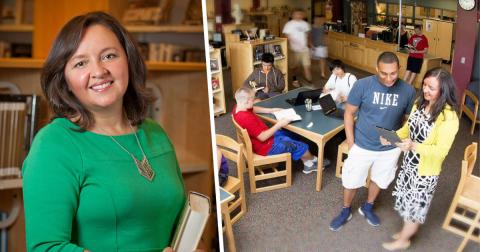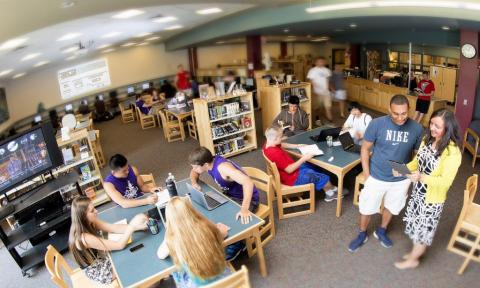Pam Harland ’19EdD

“There’s an amazingly large, longitudinal body of research studies have consistently shown a positive correlation between a full-time, certified school librarian and student achievement,” says Professor Pam Harland. “Standardized language arts test scores go up and were strongest for at-risk and low income students.”

Harland coordinates Plymouth State’s library media and digital learning specialist program. “Being a school librarian is the greatest job,” she says. “You get to talk to students about what they love and what they’re passionate about.”
The comprehensive graduate-level program is the only one of its kind in northern New England, and its fully online format is especially accommodating to practicing teachers from rural communities. The program’s core elements of interdisciplinarity, project-based learning, and use of open educational resources are emblematic of Plymouth State’s Cluster Learning model.
Harland has been a librarian for over 25 years, working in school, academic, public, and special libraries. While earning her EdD from Plymouth State in educational leadership she doubled down on the topic through her dissertation on the “Leadership Behaviors of School Librarians.” Her qualitative research studies are complemented by a career distinguished by numerous awards. She is currently chair of the Consortium of School Library Educators and New England School Library Association, and formerly served as president of the New Hampshire School Library Media Association.

School librarians need to cultivate leadership skills due to their field’s inherent interdisciplinarity. “We’re working with everyone—the principals, superintendents, special educators, and teachers,” says Harland. The public-facing aspect of their work is also critical, especially in today’s climate.
“Censorship is a hot-button issue that we’re talking about in all of our classes,” says Harland. “I teach the program’s first course, which is about strategically developing policies and procedures and what it means to have a policy in place when somebody challenges a book that’s on your shelf.”
Her students learn that the Constitution’s First Amendment protections extend to K–12 students. “They have rights to access the information that they want to read,” explains Harland. “The courts have really stood by libraries and support that.”
Today’s school librarians have critical roles in teaching students how to ‘read laterally’ in order to spot misinformation and propaganda by confirming information with credible sources. “The traditional role of the school librarian has evolved dramatically with the onslaught of digital information that must be vetted and validated, and learning tools that must be integrated into classrooms,” says Harland. “Librarians are curators of mountains of information, and must be prepared to teach students how to think critically about the information they’re accessing.”
Harland’s preparation of students to become leaders is inculcated through class discussions on how to build relationships with the school community and beyond, and how to move forward with confidence. The pandemic provides a ready example. “At the start, a lot of library leaders really took action, pointing out to parents how to access information,” says Harland. “Nobody told them they had to do this. They didn’t wait because they knew how to use tools and were thinking big.”

